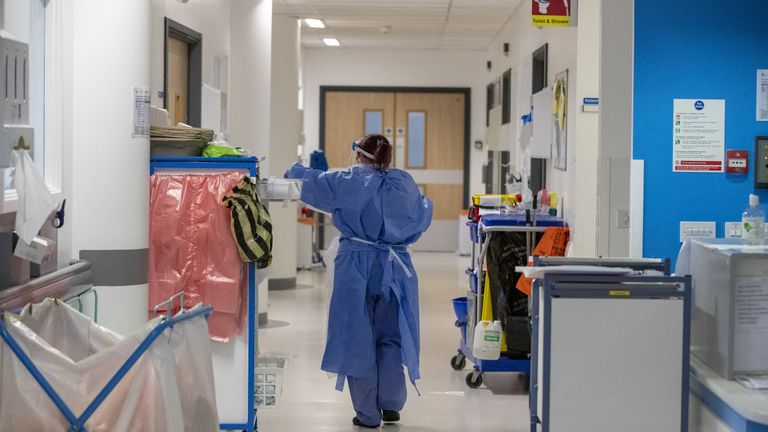COVID-19: 'We're still in shock' - Doctor who's worked every day of pandemic fears for medics' mental health
Dr Zahid Chauhan says during low points he's thought to himself: "Is this ever going to end?"
Sunday 27 December 2020 16:17, UK
A doctor who hasn't taken a day off since March says he is "proud" of his role in fighting coronavirus - but that it's been "very, very difficult" to deal with the regular death of patients and colleagues.
Dr Zahid Chauhan hasn't been able to take time off since the start of the pandemic because of his role as a GP and a cabinet member for health and social care in Oldham Council.
He said he feels "privileged and honoured" to have played a role influencing policy, as well as "actually helping to preserve lives and save lives" as a doctor.
However, the 44-year-old worries that health professionals could suffer lasting damage to their mental health and said he has sometimes felt "really, really low".
"The particular one was seeing your colleagues dying, and seeing yourself going home, and when you're trying to catch some sleep actually thinking about you dying," he said.
"Because all day long, that's all you're hearing: your patient is on a ventilator, or this patient died, or your colleague has died.
"It was a very, very difficult time - not that it's got much easier yet, but there was a lot of uncertainty."
"There were two weeks in a row where I had to get up literally every morning at three o'clock, half-past three, because it was so busy," Dr Chauhan added.
He said having to start from scratch in the early days of the pandemic, when there was limited knowledge about COVID-19, was challenging as "everything had to change at 1,000mph speed".
"Services had never seen anything similar before so it was difficult for services to react," Dr Chauhan said.
"People had to adjust not only their lifestyle, their work style, their working environment, how they sought help, how they got help, the use of technology... It was like fighting on loads of different fronts."
Despite the difficulties, Dr Chauhan said the way health professionals adapted and improved things after learning more about COVID-19 was "remarkable".
He said society as a whole had adjusted "really well".
"Everything had to be rebuilt in a different way. That's quite a lot in the space of eight, nine months to go through," he said.
"At that time, I was really, really low, thinking, 'What the hell is going on? Is this ever going to end?'
"It does have a significant impact on your mental health. I don't think that will go away - I think maybe at the moment we're still in a state of shock and we don't probably still recognise it."
:: Anyone experiencing difficulties can contact Samaritans UK on 116 123, or by emailing [email protected]




